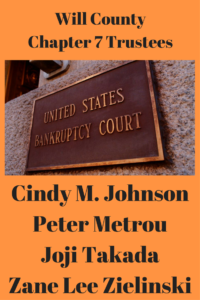Difficult Trustees
Nobody likes difficult people. Nobody likes to feel that they have been put through the ringer. Nobody wants to feel that they have been harassed, abused, and given an unnecessarily rough ride in the process. Unfortunately, this is a common occurrence in some Will County chapter 7 bankruptcy cases. Let me cite a recent example:
An attorney from my office recently was out in Will County for chapter 7, 341 meeting hearings. He had a few meetings at 9:30 AM, followed by a meeting or two  concluding at 1:30 PM per the schedule. What should’ve been a very easy day turned out to be an extremely difficult day thanks to the Chapter 7 trustee sitting that particular day. Let’s start with the timeframe.
concluding at 1:30 PM per the schedule. What should’ve been a very easy day turned out to be an extremely difficult day thanks to the Chapter 7 trustee sitting that particular day. Let’s start with the timeframe.
Typical Meetings
A chapter 7 meeting before the trustee can last anywhere from 2 to 10 minutes on average. Each case is different and some cases demand greater analysis and scrutiny and questioning of the debtor. There are other cases where there is very little involved in terms of assets, expenses, and debts. Based upon this fact, each panel trustee can hear anywhere from 5 to 7 meetings per half hour if they can remain on schedule. In the case of Will County and the most recent hearing date, the trustee was running literally three hours behind schedule. Please note that the trustee was not late to start the day. The trustee simply did not have the wherewithal, decency, efficiency or ability to conduct the meetings in accordance with the schedule which is sent out on notice. Thus, debtors who were scheduled for 1:30 PM did not have their cases heard until 4:30 PM. Some debtors were required to leave prior to their hearing time because they had children to pick up their children from daycare.
Bank Statements Required
Another issue leading to huge delays in Will County is the fact that the trustee demanded to see bank statements covering the two months prior to filing for every debtor. If the debtor did not have the documentation, the trustee was willing to hold the meeting later that day provided the debtor returned with the requested information. Although this request of the trustee is technically within the purview of a trustee’s rights under the bankruptcy code, it is not an item that if not provided should preclude the meeting of creditors. The trustee should conduct the meeting per the schedule and wait to file a no asset report until such time that the bank statements are received. First and foremost, the debtor and counsel are present. They have planned accordingly for the proper date and time and are ready, willing, and able to testify. Secondly, creditors have been notified of that date and may very well be at the hearing to question the debtor. Those creditors and their counsel have planned accordingly for the proper date and time and would like the meeting to go forward. The trustee is also available. There is simply no good reason for the 341 meeting of creditors to not be held under those circumstances.
US Trustee Oversight
Hopefully, the US Trustee’s office will look into the hearing practices of some of the trustees throughout the district. There has to be some uniformity regarding trustee practices in Chapter 7 cases. If not, the entire system gets thrown into chaos. To make matters worse, the majority of these cases are simple, chapter 7, no asset cases. We are not talking about complex chapter 11 cases where the trustee would want to examine everything in advance of the meeting. In the recent example cited above, the only item missing was bank statements. In some cases, there were bank statements provided. However, there may have been a statement or a month that was missing.
In conclusion, debtors filing for bankruptcy are seeking relief. They have been through enough stress, trials and tribulations which have lead them to this point of filing for bankruptcy. The process for getting through a routine meeting of creditors should not be the final kick to the gut. Shame on any trustee who administers that final kick.



